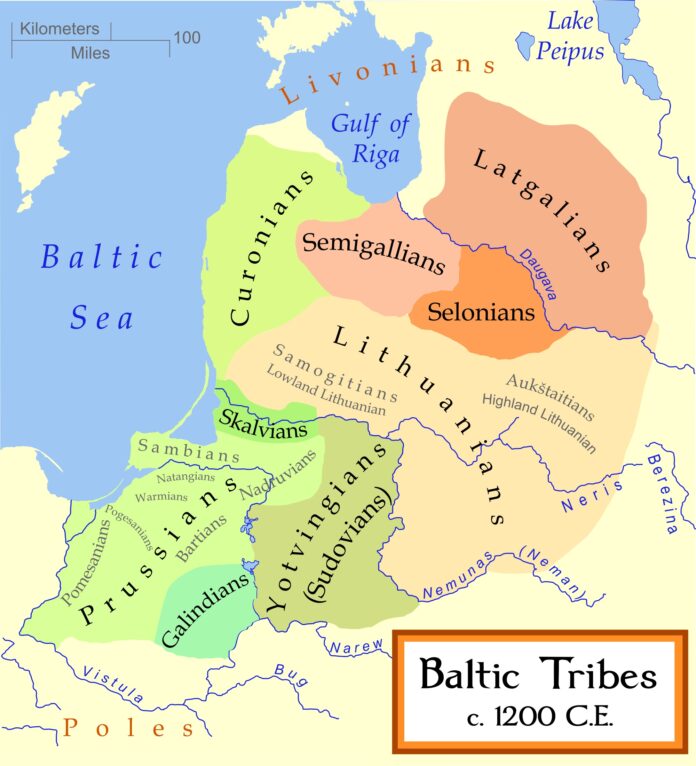
The Old Prussians were allowed to make sacrifices to the three high gods only in Romuva. Patrimpas was the god of youth, fertility and good fortune, and was portrayed as a joyous youth wearing a wreath of ears of corn on his head. His image was placed in front of a pot filled with live grass snakes (Lith. žalčiai). Perkūnas was the god of natural phenomena (thunder) and justice, and was portrayed as a stern middle-aged man with a crown of flames. In front of his image burnt a sacred flame, which was kept going day and night. Pikulas was the god of death and the underworld; he was presented as a deathly pale old man with a shroud wrapped around his head. In front of his image were placed the skulls of humans, horses and cows.
Patrimpas, Perkūnas and Pikulas’ appearances and roles relate to the three main processes in nature and human life – birth/growth, maturity, aging/death. The repetition of these process acts as the engine of the world, unceasing motion through changes. The origin of the engine was God – the creator of the world and the lesser gods – who was recognized by all the Baltic peoples, including the Old Prussians. They called God by the name of Deivs [in modern-day Latvian “Dievs” and in Lithuanian “Dievas”] and Ukapirmis (the First of All) and they viewed the light of the day as his visible manifestation. It’s possible that the Old Prussians did not pray directly to God, but through God’s sons – Patrimps, Perkūnas and Pikulas, to whom God had given authority over the world. Among the people, the most popular deity was that which took care of the important things in life – the fertility of the land, favourable natural conditions, good health, and success in farming and war. In ancient texts, there are many mentions of the lesser gods and mythical beings of the Old Prussians: Kurķis – the god of corn, who dwelt in the last sheaf of corn to be mown, just as the Old Latvian god Jumis; Aušauts – the god of health; Pilvītis – the god of wealth; Bārdaits – the god of navigation; berzduki and markopoli – house gnomes and spirits. Food and livestock were sacrificed to the gods; and to the higher gods were sacrificed a third of the spoils of war. The sacrifices were usually burnt on a holy fire in the sacred groves. At particularly difficult times for the people, such as war and harvest failure, humans were also sacrificed, most of whom were prisoners captured in battle. The chronicles mention occasions when the Old Prussians burnt captured crusaders together with their horses and weapons.
In Old Prussian society an unusually great importance was placed on “spiritual intelligence” and on the high priests and priestesses. These were unmarried or widowed men and women who carried out the religious ceremonies – sacrifices, blessing the land and dwelling places. They were teachers, soothsayers, singers and seers of the people. Many of the priests – who were respected old widowers – would live together with the krivų krivaitis in Romuva.
Even as late as the 16th century, the chronicler Simon Grunau observed a high priest at work in a Prussian village. The high priest told the people of the village about the origins and gods of the Prussians, and gave ethical instruction, which the chronicler described as explanations of the ten commandments. The priest killed a goat to atone for the sins of the people of the village, which the Prussians then cooked and ate together. Assistance from these priests was sought even by the men of Christian countries. In 1525, the coastal territories of the Livonian Order were threatened by a large Polish fleet. The Order master turned for help to the famous high priest Vaitīns Suplīts, who killed a sow on the seashore, cast a number of magic spells and then threw the animal’s carcass into the sea. The Polish soldiers in the ships suddenly felt such a huge, inexplicable sense of fear that they did not dare make a landing on the coast. Not only that, but all the fish fled from the waters next to the coast, so that the fishermen were in danger of starvation. But after the priest returned to the seashore and performed some different spells, the fish came back.
When the legendary rulers of the Old Prussians Prutenis and Videvutis had reached more than a hundred years of age, the Prussian lands were divided between the sons of Videvutis; it is from them that each of the regions takes its name. Prutenis ordered the priests to choose a new krivų krivaitis from among their ranks. Then, at Romuva, both old men blessed the people one last time, urged them to honour the high gods, live in harmony with one another and protect the freedom of their people. Then Prutenis and Videvutis willingly climbed on the pyre and were burnt as sacrifices to the gods.
The Old Prussians believed that through fire people and sacrifices reached the world of the gods. Archaeological excavations have shown that the Old Prussians burnt their dead together with their work tools, jewellery and weapons, which would serve in the afterworld just as they had in the land of the living. The ashes of the funeral pyre were frequently poured into a clay pot and buried in the earth.



























